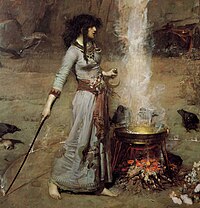
| Part of a series on |
| Witchcraft |
|---|
 |
In Africa, witchcraft refers to various beliefs and practices. These beliefs often play a significant role in shaping social dynamics and can influence how communities address challenges and seek spiritual assistance. However much of what witchcraft represents in Africa has been susceptible to misunderstandings and confusion, thanks in no small part to a tendency among western scholars since the time of Margaret Murray to approach the subject through a comparative lens vis-a-vis European witchcraft.[1] The definition of witchcraft differs between Africans and Europeans which causes misunderstandings of African conjure practices among Europeans.[2] While some colonialists tried to eradicate witch hunting by introducing legislation to prohibit accusations of witchcraft, some of the countries where this was the case have formally recognized the existence of witchcraft via the law. This has produced an environment that encourages persecution of suspected witches.[3]
In Cameroon among the Maka people, witchcraft is known as djambe and encompasses occult, transformative, killing, and healing aspects.[4] In the Central African Republic, hundreds of people are convicted of witchcraft annually, with reports of violent acts against accused women.[5] The Democratic Republic of the Congo witnessed a disturbing trend of child witchcraft accusations in Kinshasa, leading to abuse and exorcisms supervised by self-styled pastors.[6] Ghana grapples with accusations against women, leading to the existence of witch camps where accused individuals can seek refuge, though the government plans to close them.[7]
In Kenya, there have been reports of mobs burning people accused of witchcraft, reflecting the deep-seated beliefs in the supernatural.[8] Malawi faces a similar issue of child witchcraft accusations, with traditional healers and some Christian counterparts involved in exorcisms, causing abandonment and abuse of children.[9] In Nigeria, Pentecostal pastors have intertwined Christianity with witchcraft beliefs for profit, leading to the torture and killing of accused children.[10] Sierra Leone's Mende people see witchcraft convictions as beneficial, as the accused receive support and care from the community.[11] In Zulu culture, healers known as sangomas protect people from witchcraft and evil spirits through divination and ancestral connections.[12] However, concerns arise regarding the training and authenticity of some sangomas.
Historian Jacob Olupano writes about witchcraft and religion in Africa: "...African religions are not static traditions, but have responded to changes within their local communities and to fluxes caused by outside influences, and spread with diaspora and migration". Witches in Africa "serve as authority figures and intermediaries between the social world and the cosmic realm".[13]
- ^ Okeja, Uchenna (2011). 'An African Context of the Belief in Witchcraft and Magic,' in Rational Magic. Fisher Imprints. ISBN 978-1848880610.[page needed]
- ^ Bachmann, Judith (2021). "African Witchcraft and Religion among the Yoruba: Translation as Demarcation Practice within a Global Religious History". Method & Theory in the Study of Religion. Retrieved 12 April 2024.
- ^ Igwe, Leo (September–October 2020). "Accused Witches Burned, Killed in Nigeria". Skeptical Inquirer. Amherst, New York: Center for Inquiry.
- ^ Geschiere, Peter (1997). The Modernity of Witchcraft: Politics and the Occult in Postcolonial Africa. Translated by Peter Geschiere and Janet Roitman. University of Virginia Press. p. 13. ISBN 0813917034.
- ^ "The dangers of witchcraft". Archived from the original on 2010-03-12. Retrieved 2010-03-26.
- ^ "Kolwezi: Accused of witchcraft by parents and churches, children in the Democratic Republic of Congo are being rescued by Christian activists". Christianity Today. September 2009. Archived from the original on 2011-11-14. Retrieved 2011-10-14.
- ^ Whitaker, Kati (September 2012). "Ghana witch camps: Widows' lives in exile". BBC News. BBC. Archived from the original on October 20, 2018. Retrieved September 1, 2012.
- ^ Kanina, Wangui (2008-05-21). "Mob burns to death 11 Kenyan "witches"". Reuters. Archived from the original on 2017-06-20. Retrieved 2016-09-15.
- ^ Byrne, Carrie 2011. Hunting the vulnerable: Witchcraft and the law in Malawi; Consultancy Africa Intelligence (16 June):
- ^ "Stepping Stones Nigeria 2007. Supporting Victims of Witchcraft Abuse and Street Children in Nigeria". humantrafficking.org. Archived from the original on 2012-10-17.
- ^ West, Harry G. Ethnographic Sorcery (p. 24); 2007. The University of Chicago Press. ISBN 978-0226893983 (pbk.).
- ^ Cumes, David (2004). Africa in my bones. Claremont: New Africa Books. p. 14. ISBN 978-0-86486-556-4.
- ^ Olupano, Jacob (2014). African Religions: A Very Short Introduction. Oxford University Press. ISBN 9780199790586.
© MMXXIII Rich X Search. We shall prevail. All rights reserved. Rich X Search
